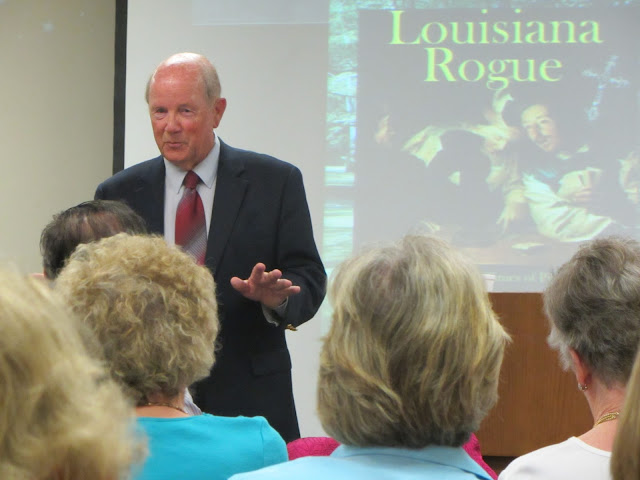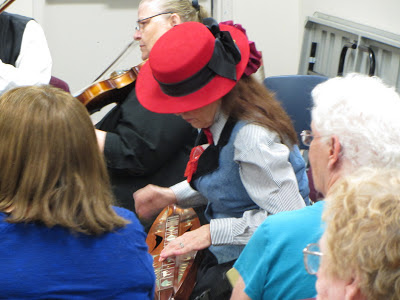Friendswood astronaut Jerry Ross will speak at the
Friendswood Public Library on Thursday, July 11 at 7pm.

Below is an excerpt from Spacewalker: My Journey in Space and Faith as NASA’s Record-Setting Frequent
Flyer by Jerry L. Ross.
ONE
Sputnik, a
mouse, and blackberry pie
When I was born on January 20, 1948, there
were no astronauts. There were no space capsules or Space Shuttles. There was no NASA and no International Space
Station. Orville Wright ---who with this
brother, Wilbur, designed, built, and flew the world’s first airplane---was
still alive. He died ten days later at the age of seventy-six.
Airplane flight was barely forty-four
years old, and the term “Jet Age” was so new it was rarely used. The real “Jet Age” was still a few years
away, and the “Space Age” would drop right on top of it as daring pilots such
as Chuck Yeager pushed the boundaries of possibility. On October 14, 1947, Chuck had piloted the
Bell X-1 airplane and flew faster than the speed of sound for the first time.
The only spacemen in 1948 were Buck Rogers
and Flash Gordon, and they were in comic books and movies. While space had captured the imaginations of
science fiction writers and some scientists, the public viewed spacemen as
whimsically as the “Man in the Moon.” Space travel was still a fantasy.
In 1948, Virgil “Gus” Grissom, who later
would become the second American in space and the first person in the world to
be launched twice, was a sophomore studying engineering at Purdue University,
seventy miles south of my northern Indiana hometown. He’d probably never heard
the word “astronaut.” He wanted to be a United States Air Force pilot. Neil Armstrong was an eighteen-year-old
Purdue freshman with no idea that in twenty-one years he would put his
bootprints on the Moon.
While they could not know what lay ahead,
the future was brewing inside them as they walked across the redbrick campus
carrying thick calculus and physics textbooks and slide rules holstered in
leather cases. The next twenty-one years would transform the world, and I lived
through it. It made me what I am today.
I am an astronaut.
 In my life I have seen views of Earth and
the universe from a perspective once known only to God. Any yet, I grew up in a time so distant from
today that electric can openers were considered high tech. And my family didn’t
have one.
In my life I have seen views of Earth and
the universe from a perspective once known only to God. Any yet, I grew up in a time so distant from
today that electric can openers were considered high tech. And my family didn’t
have one.
I have launched into space seven times and
ventured into the blackness of the universe on nine spacewalks.
From two hundred miles high I have watched
lightning pop through dark clouds stretched across the Amazon, seen the
Himalayas reach up to greet me, and looked down at the Indiana hometown from
where I once looked up at the stars.
The world we live in today was
unimaginable when I was a boy, and space has made the difference. In the twenty-first century, all of us are as
closely linked to space as the cellular phones in our pockets. We are linked to space by television,
financial transactions, the Internet, weather forecasts, and GPS. The technology we employ every day has been
made possible by space systems. Our
exploration of space has not only opened up the universe and fostered new
technologies that we use here on Earth, but it has also taught us about our planet
and its environment. The impact has been revolutionary.
Thirty years of that exploration was
dominated by a ship that was launched, returned to Earth, and sent back into
orbit again---the Space Shuttle. We were
awed by it, inspired by it, and sometimes saddened by it. And I was there for it all---from the first
Shuttle mission to the last. It was the
adventure of my life. Now the Space
Shuttle program has run its course, the orbiters are in museums, and I am very
concerned that America is walking away from its hard-earned leadership in
space.
Our missions were filled with danger,
excitement, hard work, tension-breaking laughter, and good times as we launched
off the face of the Earth in an explosion that could be seen, heard, and felt
miles away. We did things no one had
ever done before. I want to share the
amazing experiences I had pursuing my dream and help you understand what it
felt like to ride those rockets and walk in space.
We saw views that no camera has ever been
able to fully capture. Seeing the beauty
of Earth from orbit along with the enormity, complexity, and the order of the
universe strengthened my faith in a loving God who gave us a beautiful, fragile
place to live. I want to share how God
has directed my path with the hope that others will choose to experience their
own journeys in faith.
My journey wasn’t easy. It was difficult. It came with all the failures and setbacks
that are part of life. I reached my
dreams by always believing in them---no matter how distant they seemed---and by
sticking with them through trial, error, and success. I want you to know that the incredible dreams
inside you, whatever they might be and wherever they might take you, can be
within your grasp if you believe and persevere.
My journey in space, faith, and life all
began at the same time, in the same place, in the all-American Midwest town of
Crown Point, Indiana, in an era when the Moon was still unreachable but a boy’s
dreams could take him to the stars…












